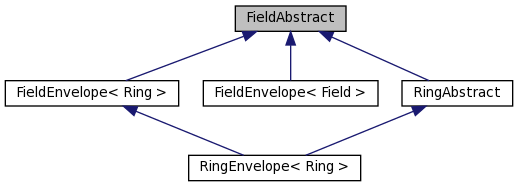field base class. More...
#include <abstract.h>
 Inheritance diagram for FieldAbstract:
Inheritance diagram for FieldAbstract:Public Types | |
| typedef ElementAbstract | Element |
| element type. | |
| typedef RandIterAbstract | RandIter |
| Random iterator generator type. | |
Object Management | |
There are no public constructors for this class. It should only be used in tandem with FieldArchetype. | |
| class | FieldArchetype |
| FieldArchetype is friend. | |
| virtual | ~FieldAbstract (void) |
| Destructor. More... | |
| virtual FieldAbstract * | clone () const =0 |
| Virtual copy constructor. More... | |
| virtual FieldAbstract & | operator= (const FieldAbstract &F)=0 |
| Assignment operator. More... | |
| virtual Element & | init (Element &x, const integer &y) const =0 |
| Initialization of field element from an integer. More... | |
| virtual integer & | convert (integer &x, const Element &y) const =0 |
| Conversion of field element to an integer. More... | |
| virtual integer & | cardinality (integer &c) const =0 |
| Cardinality. More... | |
| virtual integer & | characteristic (integer &c) const =0 |
| Characteristic. More... | |
| FieldAbstract () | |
| Default Constructor. More... | |
Detailed Description
field base class.
Found in the file
- See also
- {linbox/field/abstract.h}. Abstract base class used to implement the field archetype to minimize code bloat. All public member functions of this class are purely virtual and must be implemented by all derived classes.
If a template is instantiated on the field archetype, we can change the field it is using by changing the derived class of this class. This allows us to change the field used in a template without having to reinstantiate it. This minimizes code bloat, but it also introduces indirection through the use of pointers and virtual functions which is inefficient.
Constructor & Destructor Documentation
◆ ~FieldAbstract()
|
inlinevirtual |
Destructor.
Required because of virtual member functions. Virtual.
◆ FieldAbstract()
|
inlineprotected |
Default Constructor.
Required by derived classes, but protected because this class should never be constructed by itself.
Member Function Documentation
◆ clone()
|
pure virtual |
Virtual copy constructor.
Required because constructors cannot be virtual. Passes construction on to derived classes. Purely virtual. This function is not part of the common object interface.
- Returns
- pointer to new object in dynamic memory.
Implemented in RingEnvelope< Ring >, FieldEnvelope< Field >, and FieldEnvelope< Ring >.
◆ operator=()
|
pure virtual |
Assignment operator.
Purely virtual.
- Returns
- reference to self
- Parameters
-
F constant reference to FieldAbstract object
Implemented in RingEnvelope< Ring >, FieldEnvelope< Field >, and FieldEnvelope< Ring >.
◆ init()
Initialization of field element from an integer.
Behaves like C++ allocator construct. This function assumes the output field element x has already been constructed, but that it is not already initialized. Purely virtual.
- Returns
- reference to field element.
- Parameters
-
x field element to contain output (reference returned). y integer.
Implemented in FieldEnvelope< Field >, FieldEnvelope< Ring >, and RingEnvelope< Ring >.
◆ convert()
Conversion of field element to an integer.
This function assumes the output field element x has already been constructed, but that it is not already initialized. Purely virtual.
- Returns
- reference to integer.
- Parameters
-
x reference to interger to contain output (reference returned). y constant field element.
Implemented in FieldEnvelope< Field >, FieldEnvelope< Ring >, and RingEnvelope< Ring >.
◆ cardinality()
Cardinality.
Return integer representing cardinality of the domain. Returns a non-negative integer for all domains with finite cardinality, and returns -1 to signify a domain of infinite cardinality. Purely virtual.
- Returns
- integer representing cardinality of the domain
Implemented in FieldEnvelope< Field >, FieldEnvelope< Ring >, and RingEnvelope< Ring >.
◆ characteristic()
Characteristic.
Return integer representing characteristic of the domain. Returns a positive integer to all domains with finite characteristic, and returns 0 to signify a domain of infinite characteristic. Purely virtual.
- Returns
- integer representing characteristic of the domain.
Implemented in FieldEnvelope< Field >, FieldEnvelope< Ring >, and RingEnvelope< Ring >.
The documentation for this class was generated from the following file:
- field/abstract.h

 1.8.13
1.8.13